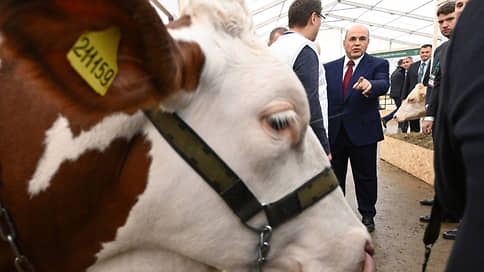The harvest is not a hindrance to the course – Newspaper Kommersant No. 185 (7386) of 10/06/2022
[ad_1]

One of the key topics of yesterday’s strategic session on the sidelines of the Golden Autumn exhibition, despite the high results of the agro-industrial complex (AIC) in terms of the production of raw materials, was sectoral problems. Among them, dependence on imported seeds, equipment and machinery: it is proposed to increase their production by increasing concessional lending to such projects, as well as a lag in grain exports, which can turn into an overstocked market, which requires stimulation of processing.
At the strategic session “Food Security of Russia and the World” within the framework of the agro-industrial exhibition “Golden Autumn” yesterday, officials and entrepreneurs presented their vision of the current state of the agro-industrial complex. On the one hand, as follows from the speech of Prime Minister Mikhail Mishustin, the government considers the sector sustainable – record harvests of grain, fruits and berries are expected, and exports in January-August grew by 16% year-on-year. It should be noted that often the results of the industry were associated with very significant amounts of state support – in the 2022 budget, according to the prime minister, more than 280 billion rubles were provided for the implementation of the state program for the development of the agro-industrial complex, but due to the “difficult situation” by the end of September, 380 billion rubles In particular, additional funds were allocated to subsidize preferential loans after the growth of the key rate and to expand the program itself. In 2023, the prime minister said, more than 340 billion rubles are included in the budget of the state program.
On the other hand, the industry has accumulated a lot of problems, both opportunistic (difficulties with logistics and settlements, as well as exchange rate volatility), and systemic, identified against the backdrop of sanctions and the withdrawal of Western companies from the Russian Federation, first of all, this is dependence on imports, including including, according to the head of the Ministry of Agriculture Dmitry Patrushev, seeds: domestic selection and genetics, in fact, did not develop. According to him, it is necessary to provide the market with its own selection in the future in two to three years. The second problem is a significant share of imported agricultural machinery and difficulties with its maintenance. Although, according to Dmitry Patrushev, since the spring the situation has already become “a little better” – due to the growth of its own production and the supply of spare parts.
According to market participants, the agro-industrial complex has generally coped with the task of updating the fleet of equipment, but the situation remains heterogeneous – as Eduard Zernin, chairman of the board of the Union of Grain Exporters, noted, for example, import substitution in vegetable growing is “at the very beginning of the journey”. In his opinion, an increase in funding for priority localization projects and the development of a production and component base for agricultural machinery at the expense of concessional loans from the Industrial Development Fund can help — the current limits are not enough to launch large-scale production, so it is necessary to increase the maximum loan amount from 5 billion rubles. up to 15 billion rubles.
Lagging grain exports were also noted as a risk factor in the industry – according to Dmitry Patrushev, it is planned to compensate for it in the fourth quarter, while about 8.3 million tons of grain have been exported since the beginning of the year. According to Eduard Zernin, the backlog is “stably 20% from the previous season” – taking into account the record harvest (about 150 million tons is predicted), the “under-delivery” of grain will lead to overstocking of the domestic market. To balance, he believes, it is necessary to develop processing to increase the production of value-added goods – both for domestic consumption and for export. In response, Dmitry Patrushev assured that there are “more and more” processed products in the export structure (growth by one and a half times in five years) – the Ministry of Agriculture is generally ready to support this trend, facilitating expansion into new markets. As an example, the minister cited the introduction of duties on grain exports, which caused a fourfold increase in flour exports, and promised “to continue doing this in order to set clear conditions for business.”
[ad_2]
Source link






